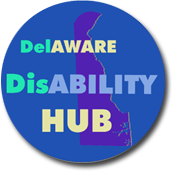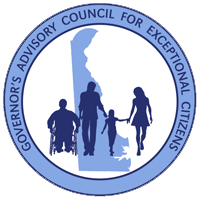GACEC and the Transition Task Force
The Individuals with Disabilities Education Act (IDEA) requires that each State establish and maintain an advisory panel to advise special education staff regarding the education of eligible children with disabilities. At the federal level, the Governor's Advisory Council for Exceptional Citizens (GACEC) serves as the State Advisory Panel for the Individuals with Disabilities Education Act (IDEA) in Delaware. The GACEC monitors services and makes recommendations on behalf of students with exceptionalities to the Governor, General Assembly, Secretary of Education, and the State Board of Education. Students with exceptionalities include both students in special education and students who are considered gifted and talented. Delaware increased the role of the Council to include advising and advocating on the unmet service needs of all citizens with exceptionalities in Delaware from birth to death.
The mission statement of GACEC is to provide leadership through advice and advocacy for the unmet needs of citizens of all ages who are exceptional and to improve their lives. The Council sends observations and recommendations on regulations and legislation to the Delaware General Assembly, Department of Education (DOE), Department of Health and Social Services (DHSS) and other agencies. This assists these agencies with their understanding of the implications of regulatory and legislative changes impacting the lives of persons with disabilities.
Council members and staff participate on over sixty councils, boards or committees, such as the DOE Access to General Education Curriculum (AGEC), Developmental Disabilities Council (DDC), State Council for Persons with Disabilities (SCPD), and the Delaware Coalition for Americans with Disabilities (DCADA), to name a few. Involvement on the various committees or task forces and collaborations with other councils assists the GACEC in its ability to advise and advocate for systemic changes.
The GACEC also works with individuals in the private sector to assist with advocacy projects that provide information and assist individuals with disabilities. Through its participation with other groups, the Council can assist in the design of programs, community services and supports for persons with special needs. Council educates Delawareans on issues and services related to children, youth and adults. Giving increased education on disability issues will lead to improvements in inclusion, productivity and equality for persons with disabilities. Council also advises and provides recommendations for systemic change activities that allow individuals with disabilities and their families to have input into the design and provision of needed community services. This may include individualized supports and other forms of assistance that promote self determination, independence and productivity through culturally competent programs.
The GACEC works in collaboration with the Exceptional Resources workgroup of the Delaware Department of Education on issues affecting the education of students with exceptionalities.
Council believes strongly in its role to advise and advocate on behalf of individuals with exceptionalities to improve their lives.
Transition Task Force and www.Deldhub.com
Having a website to assist students, parents, caregivers, teachers, administrators, providers, social workers and all other interested parties to understand transition and how to access resources was one of the many recommendations that came out of the State Transition Task Force for Emerging Adults with Disabilities and Special Health Care Needs (Transition Task Force).
There was a need to develop, support and maintain a transition website to improve access to information about transition planning. The DelAWARE DisABILITIES HUB website was born from that need.
The Transition Taskforce was established by Senate Concurrent Resolution (SCR 34), which was sponsored by Senator Bethany Hall-Long and Representative Rebecca Walker. The Task Force was chaired by Governor's Advisory Council for Exceptional Citizens (GACEC) Chairperson, Terri Hancharick and Executive Director, Wendy Strauss. The Chairs met with Governor Jack Markell, Lt. Governor Matt Denn, and the Secretaries of Education, Housing, Transportation, Health and Social Services, Division of Services for Children, Youth and their Families and Department of Labor to obtain buy in for the development and sustainability of the Transition Website.
The taskforce was comprised of 31 members from a variety of backgrounds as well as work groups for housing/ transportation, education, employment, and health in addition to an IEP group. Taskforce co-chairs met with the cabinet secretaries prior to the introduction of the Taskforce bill to obtain buy-in on the importance of the bill and to ensure they were committed to sending one of their staff to the meetings.
Throughout this website the term "disabilities" refers to all physical, developmental, intellectual, behavioral, learning or mental health disabilities. Some examples of "special health care needs" are conditions such as Diabetes, Asthma, Cystic Fibrosis, Epilepsy and Cardiac conditions. The website has information about transition and how it relates to education, post- secondary education, employment, transportation, housing, and health. In the main categories there are resources from various agencies and organizations, in and out of the State, lesson plans, videos as well as a Tool-Kit of forms and publications that may be beneficial when transitioning and will assist in the process. Other areas of interest are profiles in progress of young adults with disabilities and or special health care needs who are either currently receiving or have received special education services.
Sustainability of the website was always in the forefront of the planning committees. In order to ensure that the website is kept up-to-date and accurate, Memorandums of Understanding (MOUs) have been sought from the Secretaries of the Department of Health and Social Services, Department of Services for Children, Youth and their Families, Department of Education, Department of Transportation and Delaware State Housing Authority. Each will contribute funding to sustain the web-site and further the mission of the Taskforce and a one- stop site with accurate, up-to-date information that is accessible to all. The first phase of the website covers an age range of 14 to 30.
A huge thank you is owed to our community partners for their commitment to the Transition Task Force.
The transition process is truly a collaborative effort as was the planning and designing of this website. In addition a huge thank you goes out to our Joint Finance Committee and Legislators for funding the development of this website. Thank you also to the Delaware Department of Technology and Information for their staff support as well as their additional funding to support this endeavor. A debt of gratitude is owed to Dr. Ninka Dosa and the folks at Healthy Transitions N.Y. for allowing us to share so much of their wonderful information with Delawareans. Thank you to the Disability Law Program for collaborating and sharing your expertise with us.
A special heart-felt THANK YOU, to the organizations across the United States that kindly gave us permission to use information from their websites; because of this we did not have to re- invent the wheel. It is inspiring to see so many people working to create a better life for individuals with disabilities.
Everyone involved was fully vested in the importance of this website and saw the need to bring this information together in one place. It has been a pleasure sharing ideas with professionals, parents, organizations and self-advocates while designing a comprehensive transition website. This website will continue to grow as we continually seek out new resources to assist individuals with disabilities.









